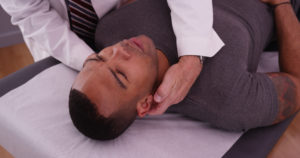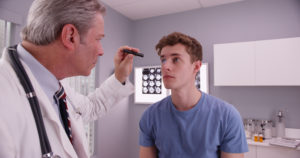The consequences of suffering a concussion have prompted considerable discussion in recent years. Less has been said about the changing understanding of how concussions should be treated. Medical professionals today prescribe more structured activity and put less emphasis on having a person rest after a concussion diagnosis. Neurologists are finding that patients experience concussions in different ways.
Concussions – mild traumatic brain injuries – are commonly suffered in slip-and-fall accidents, car accidents, and contact sports, among other incidents. The Brain Injury Alliance of Kentucky estimates that every year more than 1.2 million people suffer concussions. More than 40 people a day visit hospitals in Kentucky with symptoms of TBIs.
As brain injury lawyers in Kentucky, our attorneys frequently work with clients and the families of individuals who have suffered serious brain injuries in accidents. We’ve seen how victims of TBI recover, and we’ve assisted those who will have to adapt their lives to living with the long-term effects of a brain injury. We’re gratified when we see that medical science is finding new ways to help those with concussions and with more severe brain injuries.
What is a Concussion and What are its Symptoms?
A concussion is a mild form of traumatic brain injury (TBI) caused by a bump, blow, or jolt to the head. Concussions can occur from a fall or a blow to the body or violent shaking that causes the head to move rapidly back and forth. Doctors may describe these brain injuries as “mild” because concussions are usually not life-threatening.
The leading causes of concussion are:
Typically, a concussion leaves the victim dazed and confused for a few moments. Sometimes, people will say the victim “got his bell rung,” referring to a few moments of ringing-like noise accompanying the confusion one might experience after a blow to the head. There may also be some memory loss about events just before and after the accident.
In most cases, a concussion does not cause a loss of consciousness, though if it does happen, the injury may still be diagnosed as a mild TBI.
Longer-lasting symptoms of a concussion are often grouped into four categories:
Anyone who suffers a blow to the head, especially one that knocks them unconscious or leaves them feeling groggy, should see a doctor right away.
A doctor may order a scan of your brain or may conduct neurocognitive tests to assess your learning and memory skills, your ability to pay attention, and how quickly you can think and solve problems.
While most patients are seen in an emergency department or a doctor’s office and sent home, some stay in the hospital overnight for observation.
A New Approach to Treating Concussions

Traditionally, a patient with a concussion was prescribed days or even weeks of “complete bed rest with no bothersome stimuli to overexcite a healing brain,” writes Dr. Vernon Williams, a sports neurologist and founding director of the Center for Sports Neurology and Pain Medicine at the Cedars-Sinai Kerlan-Jobe Institute in Los Angeles.
Today, treatment usually includes a period of initial rest and a gradual return to activity in the shorter term. Newer research has demonstrated that the brain heals better with physical activity and movement – particularly for athletes, Dr. Williams says.
Baylor Scott & White Health, one of the largest not-for-profit health care systems in the United States, has adopted an “active recovery” approach to concussions. Within a structured behavioral plan and under the guidance of a concussion expert, therapists work to keep athletes as regimented as possible with a focus on regular sleep patterns, focused nutrition, adequate hydration, and decreased stress.
“After a brief rest period of about 24-48 hours in most cases, we also recommend a gradual return to normal activities, including school and physical activity, even when (the patient) may still be experiencing some concussion symptoms,” the health group says.
Meanwhile, the Centers for Disease Control and Prevention (CDC) has in recent years released new clinical recommendations for treating children with concussions and updated its mild traumatic brain injury guidelines for adults.
Dr. Williams, the sports neurologist, says the guidelines for children are evidence-based and represent a review of concussion literature consisting of some 37,000 articles published from 1990 to 2015. “Overall, the overwhelming theme of (the CDC’s) recommendations is that concussion or mild traumatic brain injury is ‘no big deal.’ Such incidents require evaluation and follow-up for the health of our young people,” he says.
AI’s role in Concussion Treatment
All those involved in student athletics in Kentucky are aware of the KY High School Athletic Association protocols for the treatment of concussions and suspected concussions during interscholastic play. The protocols require keeping a student-athlete off of the playing field after a possible or diagnosed concussion until a doctor clears the athlete to return. For many athletes, the waiting is the hardest part.
In another essay, Dr. Williams explains the exploration of using artificial intelligence and machine learning (AI and ML) to predict how long concussion symptoms will take to resolve based on combinations of symptoms present in injured high school athletes.
“We took three years of high school concussion data from high school athletes (mostly football players) who were diagnosed with a concussion and examined the effectiveness of using an algorithm to predict their concussion symptoms (headache, dizziness, and difficulty with concentrating) resolution time. … Even with the limited data set available, computer modeling was able to accurately predict symptoms associated with prolonged recovery after a concussion,” Williams writes.
Eventually, physicians will have access to larger data sets of concussion treatment and resolutions via an app or hand-held device. The data should improve the quality and accuracy of medical care relative to the treatment approach and predicted recovery, Williams predicts.
How a Kentucky Brain Injury Lawyer Can Help

As medical technology for treating concussions advances, we can expect cutting-edge medical care to be more costly when it is available. At Morgan, Collins, Yeast & Salyer, our brain injury lawyers help patients who sustained head injuries caused by the negligence of others seek compensation for medical expenses and other losses. When necessary, we also work to make sure our clients are receiving the full medical care they need.
At Morgan, Collins, Yeast & Salyer, we bring you the Kentucky Courage needed to hold insurance companies accountable and seek full compensation for your injuries. Our goal is to help you get your life back on track without the burden of medical debt. Contact us today at (877) 809-5352 to put Kentucky Courage
on your side.
The post Concussions and its Treatment are Evolving appeared first on Morgan, Collins, Yeast & Salyer.
via Morgan, Collins, Yeast & Salyer https://www.kentuckycourage.com/blog/concussions-and-its-treatment-are-evolving/
